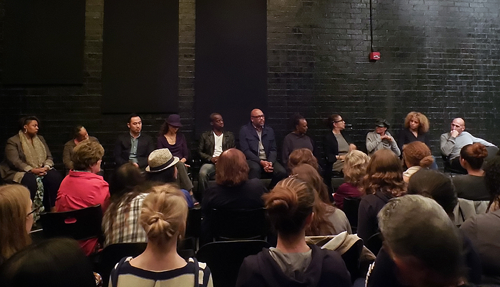A panel of eleven successful Hollywood actors, actresses and writers from various ethnic backgrounds sat shoulder to shoulder in the Players Theatre on Monday night to discuss racial stereotypes for actors of color in the presentation, “Progress? Racial Stereotypes in Hollywood.”
Cal State Long Beach graduate student and actress Roma Maffia (Nip/Tuck) hosted the demonstration as the second event in the new Affinity Series initiative, which is a series of performances, presentations and panels that touch on important social issues.
Director of Publicity for the California Reperatory Company, Caitlin Bryson, said that the Affinity Series is a newly-minted initiative envisioned by the Theatre Arts Department Chair Anne D’Zmura.
“[CSULB] theatre arts has committed to presenting a series of performances, presentations and panel events celebrating engagement on diverse, timely and important social issues with our local and global communities,” Bryson said.
Students who attended the presentation watched the panelists discuss what it was like to be pigeon-holed into stereotypical roles and the frustrations that came with it, as well as personal stories of how these writers and performers learned to adapt and overcome the issues of conventional racial ideals that the movie and television media ensue.
For many of the actors and actresses, their careers began for them by taking these stereotypical roles, because it was their only chance at work. However, even though they were easily typecast because of their ethnicity, they said they have all found a way to use their individual backgrounds in order to bring life to the characters they have portrayed.
They talked about how reality shows are dangerous for the upcoming generations because of how they portray people in negative ways, and how typecast shows, including Tyler Perry’s, perpetuate and further stereotypes.
The 11-member panel included Robert Beltran (Star Trek: Voyager), Jeremiah Birkett (Evan Almighty), Marcus Choi (Sharknado), Erica Gimpel (Fame), Michelle Hurd (The Glades), and writer and producer Teri Schaffer (The Bernie Mac Show), among others.
Each panelist took turns bouncing ideas off on another, and spreading wisdom to many of the young actors and actresses in the audience. When the issue of taking roles based on their ethnic backgrounds came up, Choi spoke up.
“At the end of the day, you’ve got to live with yourself,” Choi said. “I’ve lost jobs because I’ve had to keep my integrity.”
Birkett contrastively pointed out that sometimes, as an actor trying to make a living, it is OK to play the stereotypical role, but it is important to give the character a real life so that they aren’t simply seen as the stereotype the networks seek.
Discussions about big name television networks came up as well. The panelists spoke about how some networks like CBS or Fox start shows aimed at a specific ethnic audience, but in later seasons will “whiten” them up to improve ratings.
Hurd even shared a story about how she and Maffia had an idea to put more diversity into a series, and the email they received in return from the head of the CBS stated, “We are not interested in diversity,” Hurd said.
Another important topic that was discussed was how the television and movie business is changing.
“The game is changing,” Gimpel said. “There are more ways of gettinvvg into this business.”
Gimpel talked about how nowadays, as long as someone has a real story to tell, they can film it and create something great, even if it is just a fifteen-minute video on YouTube.
After the panelists talked for an hour and a half, the audience had the opportunity to ask the panelists questions during the remaining half hour.
In the end, Maffia said it best when she said, “There are no rules, and if [something] looks like a rule, then it might not be a rule for you.”




